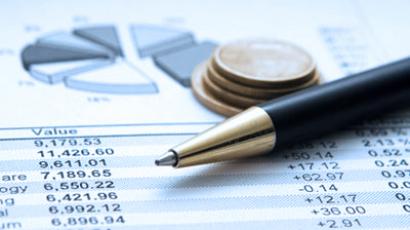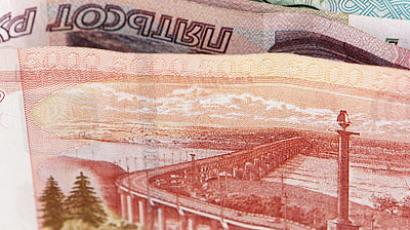Russian economy to drag in year of Dragon
Russia did not remain immune to the global turmoil in 2011, but performed better than other economies. Experts agree in 2012 its economy will follow basic world trends. Continuing mild recession, with no big economic shocks is the forecast.
How will Russia be performing in 2012? And what factors will be in play? These are the questions on everybody’s mind, as we step into the New Year.RT Business Internet talked to various experts, trying to imagine a possible picture of Russia’s economic landscape in 2012.No rosy picture for GDP growth from the experts. The key economic indicator is expected to either grow at a slower pace or remain relatively the same, at about 4%. Some pessimistic forecasts say it’ll even slide to a negative figure of -2%,Oil revenues – Russia’s cash cow – will be mostly untouched, as the oil price isn’t largely expected to fall much below $100/bbl. The prices will keep on falling, though in ups and downs during the year. Overall, inflation in Russia is expected to reach its lowest since the start of 1990’s, of around 6%, economists conclude. The rouble is generally expected to remain at roughly the same level, around 32 roubles to the US dollar. However, there’s a chance the Russian currency could slide a bit, as economic unrest in Europe will empower the dollar.Anyway, with presidential elections coming in March 2012, political factors will have an increasing influence on the Russian economy and domestic pressures are expected to become far more exciting than international ones.
Ivan Tchakarov, Chief economist for Russia and CIS at Renaissance Capital “Talking globally, we expect some more moderation in economic growth. There will be a mild and short recession in Europe, slow growth in developed economies and a soft landing in China. However, the locomotive of the world economy – Germany- is going to expand overall. So, generally, there’s going to be a global backdrop, against which Russia will also slow down.”Recently Russia has become a bit more dangerous place to invest from a political point of view, after the demonstrations following the elections. But I think the coming elections in March will prove to be even more exciting and dynamic than the elections for Russia’s State Duma. This will keep foreign investors on the side lines. After that, however, there will be more interest from abroad.”Vladimir Tikhomirov, chief economist at Otkrytie FC“I think, the political environment within Russia as well as the EU saga will be the major factors in play in 2012. Basically, I don’t expect the EU to collapse, but think the 2nd wave of the crisis is yet to come.The oil price will remain high, at about $90/bbl – $100/bbl. And the recent increase of quotas from OPEC won’t have much effect on the oil price, as most often all the body’s restrictions are conditional and almost always broken by member countries. In fact, an oil price below $90/bbl would be loss-making for most of OPEC states.The inflation rate will go up and down during the year, reaching about 6.5%-6.6% in the entire 2012. The prices will be down sharply in Q1 2012, to below 5%, but then speed up again from July 1 to reach 7.1% in 2H 2012. This will be mainly the result of the Russian Government having shifted revision of the basic payments, for gas, transport and housing and community amenities, from January 1 to July 1.”Anton Strouchenevsky, senior economist at Troika Dialog“2012 won’t bring any surprises. The world economy will remain shaky, with uncertainty and nervousness around Europe, the USA, as well as China continuously pressing the economy. Russia, however, will manage to remain basically untouched by global unrest. A wave of hysteria started to cover world economies already in August. Russia, however, demonstrated growth during the period.”The poor investment climate – the major economic evil in Russia – has every chance to improve. The need to bring Russia’s legislation into line with WTO standards, after the country becomes a full fledged member, should basically help.”Igor Nikolaev, director of strategic analysis at FBK (PKF) audit and consulting company“Russia entered the second wave of the crisis back in August this year, which will go into 2012. The main difference between the current situation and what we had 3 years ago is that then we had a quick fall followed by a quick rebound, today it’s a slow dip that’s waiting for us, and then a painful and long lasting illness.Also, the Russian Government promised to start paying more to pensioners and teachers from 2012, as well as significantly increased its plans for military expenses. The high social obligations the Russian authorities undertook, coupled with a slower economy could pose a real threat to the economy.In this situation there’s only one way out, where ordinary people will need to bear the brunt of such irresponsibility and profligacy. The money from increased taxes could fill in the gap.” Aleksandr Morozov, Chief Economist (Russia and CIS) at HSBC“Russia’s economy finished this year on a positive edge. But there are serious doubts whether these tendencies prove to be stable.First, economic growth in Russia is now based on domestic consumption and investment demand, while exports contribute marginally to the economic growth. This model is based on the processing of a sudden profit from oil sales, which happens through budget or credit channels. The latter could work only if such profit continues to grow on the back of increasing oil prices. Without such growth banks will need to restrict credit growth, which will cut consumption. To balance the federal budget we’ll need the oil price above $100/bbl. So, all stimuli to speed up economic growth are exhausted.Second, growing political risks in Russia are likely to make investors postpone many projects until the Presidential elections and a new Government is formed. This is likely to increase capital outflow and “pause” private investment in 2012.Third, the tendency of lowering inflation hasn’t yet firmed and the base inflation remains high. A negative base effect could reverse a downward inflation trend that started to appear in the second half of 2011. Also, higher inflation will eat into households’ real income, which will have a negative effect on the indicators of Russia’s economic growth.The good news is that Russia’s GDP can still grow at 3% a year and it seems quite likely that inflation will remain in single digits in 2012.”
Anastasia Kostomarova, Business RT














